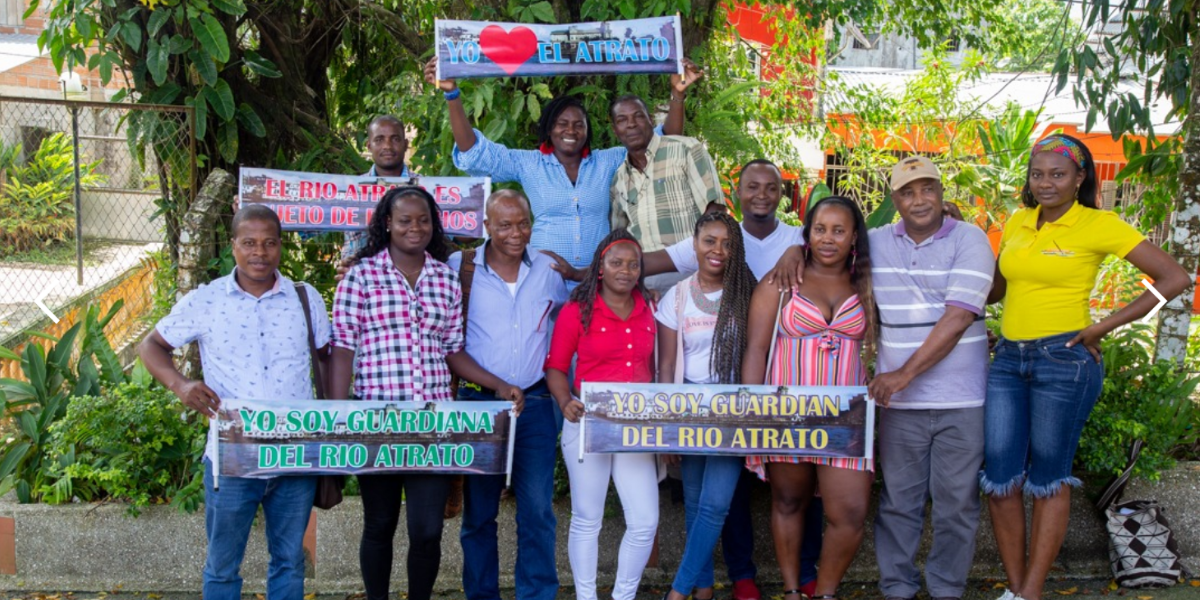From 31 October to 12 November, the 26th UN Climate Change Conference of the Parties (COP26) took place in Glasgow. Many delegations from the Global South encountered obstacles to participate in this important event due to the inequity of access to the vaccine for COVID-19 and the restrictions that still remain in their country. In this context, CIDSE shares experiences from our Global South partners as we consider their voices are among the most important ones. Our member organisation CAFOD supported the participation in COP26 of some representatives of the River Atrato guardians.
Interview by Carmen Contreras, Communications Officer at CIDSE.
Maryuri Mosquera Palacios shows me a photograph of a sunset with the most incredible colors, reflected in the waters of the Atrato River, in Colombia. “I love taking pictures of the river when I visit my neighboring communities,” she excitedly told me during our interview, one rainy afternoon in Glasgow, where COP26 was taking place.
“The river has always represented an important part of all the communities that live settled there. It is a source of transport, of production, of food, of knowledge exchange, and of interrelation with people”, adds Maryuri, who is part of the Guardians of the Atrato River team representing her community Cocomopoca. The Guardians of the Atrato River was born after the Colombian Government recognised the river as a subject of the right to protection, conservation, maintenance, and restoration.
This verdict, reached in 2016, is the result of years of work and legal action from the black and indigenous communities living on the banks of the river, who observed the environmental deterioration of the basin due to the intense and illegal exploitation of mining and forest resources. Through this result, the court affirmed that the Atrato was the home of an invaluable natural wealth for the country and the world, and recognised the important role of ethnic communities in the care and preservation of the territory.
But, while still important, the court’s verdict is just the beginning of the hard work of environmental advocates such as Maryuri. In addition to representing her community, Maryuri works empowering youth and adults through pedagogical materials and legal training. “Things are very, very slow but the work is significant because the sentence is new. As I was saying, it is in itself a great challenge”, she says.
“The main objective of coming to COP26 together with my colleagues is to make the sentence known to the world. We see the COP as a platform to get allies to help us in the process of implementing the verdict. The team of guardians works with cooperation resources because we do not have our own resources to carry out actions in the territory. But the COP was also important for us in order to understand how environmental decisions are made, what governments and especially the Colombian government are committing to in the face of environmental challenges and also in the face of threats and violations that environmental defenders have”, she points out.
According to a report published last September by Global Witness, Latin America is the most dangerous region for environmental defenders: in 2020, 227 cases of violence were registered. Furthermore, the report points to Colombia as the most dangerous country for environmental defenders, with 65 murders.
Despite the enormous challenge, Maryuri remains hopeful by thinking of her community and the river, and perhaps the photographs that she keeps on her cell phone are part of her daily motivation: “I think a lot about the rest of the communities and the rest of the people who are there, in the most remote communities, and who have great hope in what we can do through our advocacy. So, before I pass away or get bored, or get tired of what we’re doing, I always think of them. I think they have a lot of hope, it is impossible to betray the trust that the community has placed in us”.
BONUS
Books to get close to the communities in the Atrato river
It’s not available in another language, but after the verdict, we have built several educational materials and I feel that it is important to know the experience of the communities and the way we relate to nature. There is a book that was one of the first we built. It has legal issues explained, but also reflections of the communities, it is called Majestic Río Atrato. I would propose to people to read it. It is very interesting.
You can also learn more about the Atrato river here:

